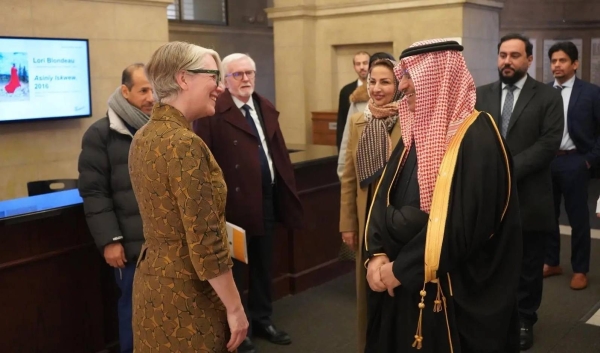
JEDDAH: Zhang Jun, the Chinese justice minister, received on Tuesday in Beijing his counterpart Walid Al-Samaani, chairman of the Supreme Judicial Council — the first visit by a Saudi justice minister to China.
The meeting, in the presence of Turki Al-Madhi, the Saudi ambassador to China, was the start of a visit to develop relations and judicial cooperation between the two countries.
Jun welcomed the Saudi justice minister and his entourage, and stressed the development witnessed in Saudi Arabia. He praised discussions for the signing of an agreement for judicial cooperation between the two countries and a new era of collaboration.
Al-Samaani noted that China was one of the most popular countries among Saudi investors, and the trade exchange between the two countries was huge. He said that the judicial agreement was important for enhancing security and assurance in commercial transactions, and for exchanging judicial and legal expertise.
Recent visits by King Salman and Crown Prince Mohammed bin Salman had encouraged a strategic agreement reviving the ancient Silk Road, a symbol of trade between China and the Arabian Peninsula through the ages. This intersected with Vision 2030, which aims to use the Kingdom’s strategic location for economic development and prosperity.
Al-Samaani presented an overview of the Saudi justice system and guarantees complying with internationally recognized fair trial standards.
He explained that adjudication of trade disputes had two tracks. The first track was settlement through the commercial judiciary represented by the Specialized Commercial Court, which was recently assigned in line with the Kingdom’s steps toward improving and expediting the commercial justice system to conform to Vision 2030 projects.
The second track was settlement through commercial arbitration, as the Kingdom had recently established the Saudi Center for Commercial Arbitration, which would enable swift dispute settlement and procedural flexibility and effectiveness.
Al-Samaani said that commercial judicial work was governed by many laws characterized by flexibility, efficiency and constant refining due to the speed and development required in commercial cases since time was important for traders.
“Regarding the enforcement of rulings, the Kingdom has established special courts to enforce various judicial rulings, commercial papers and documents recognized as execution writs under the enforcement code and its executive regulations,” he said. “These courts guarantee swift enforcement and restoration of rights via several methods they are empowered to adopt.”










